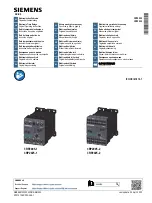
The operate value in secondary volts is calculated according to
the following equations:
For phase-to-earth measurement:
U
UBase VT
VTprim
1
100
3
>
×
×
sec
IECEQUATION2426 V1 EN
(Equation 23)
For phase-to-phase measurement:
U
UBase
VT
VTprim
1
100
>
×
×
sec
IECEQUATION2427 V1 EN
(Equation 24)
4.
Decrease the voltage slowly and note the reset value.
5.
Set and apply about 20% higher voltage than the measured operate value for one
phase.
6.
Measure the time delay for the TR1 signal and compare it with the set value.
7.
Check the inverse time delay by injecting a voltage corresponding to 1.2 × U1>.
8.
Repeat the test to check the inverse time characteristic at different over-voltage
levels.
9.
Repeat the above-described steps for Step 2 of the function.
10.5.2.2
Extended testing
1.
The tests above can be repeated for
2 out of 3
and for
3 out of 3
operation mode.
10.5.2.3
Completing the test
Continue to test another function or end the test by changing the
TestMode
setting to
Off
. Restore connections and settings to their original values, if they were changed for
testing purposes.
10.5.3
Two step residual overvoltage protection ROV2PTOV
Prepare the IED for verification of settings outlined in section
10.5.3.1
Verifying the settings
1.
Apply a single-phase voltage either to a single-phase voltage input or to a
residual voltage input with the start value below the set value
U1>
.
2.
Slowly increase the value until ST1 appears.
3.
Note the operate value and compare it with the set value.
Section 10
1MRK 511 360-UEN A
Testing functionality by secondary injection
120
Bay control REC670 2.1 IEC
Commissioning manual
















































